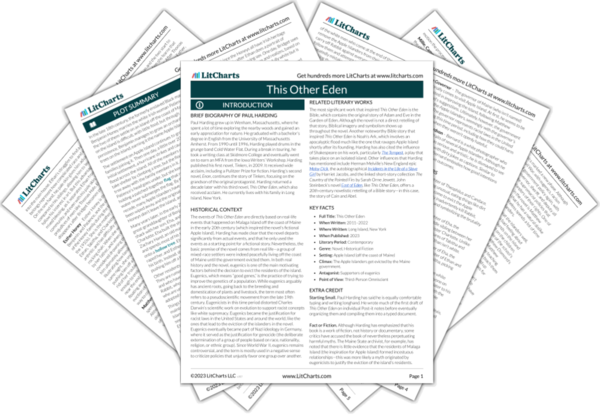Apples in novel symbolize nourishment and the fruits of labor, testifying to the success of Benjamin Honey’s settlement on a barren Maine island. The novel’s title, This Other Eden, takes its name from the Biblical story of Adam and Eve, who lived in a paradise called Eden. In many religious and artistic traditions, apples are abundant in Eden, but an apple is also the forbidden fruit, which God tells Adam and Eve never to eat. While the fruit on Apple Island is far less abundant than it is in the Biblical Eden, it nevertheless shows how faith and determination have allowed the Apple Islanders to persevere as a community.
In the Bible story, when Adam and Eve eat the Forbidden Fruit, God casts them out of Eden. Like Adam and Eve, the residents of Apple Island also find themselves cast out of their home. While the apple trees mostly have positive associations for the islanders (as symbols of their hard work and their success), the association between the island’s apples and the Biblical forbidden fruit is also significant to the story. The history of Apple Island begins with its own forbidden fruit: the interracial marriage between Benjamin and Patience. The island is full of nontraditional lifestyles family structures that outsiders view as taboo, including incestuous relationships, people who reject conventional gender roles, and close relatives with very different skin tones. While God judges Adam and Eve harshly, the novel offers a more compassionate and nuanced portrayal of the Apple Islanders. Instead, it is the Maine government that plays God by kicking the islanders out.
Apples Quotes in This Other Eden
Benjamin Honey—American, Bantu, Igbo—born enslaved—freed or fled at fifteen, only he ever knew—ship’s carpenter, aspiring orchardist, arrived on the island with his wife, Patience, née Raferty, Galway girl, in 1793.
Zachary worked by the light of a candle. As the carvings rose higher up the tree, he made them narrower and more convoluted in order to draw out the composition of each figure and scene so he would not run out of space before he ran out of mortal time, so that he would not complete a work at which he felt more and more he should finish his days laboring, dying as he etched the most elegant possible toes for a barefoot mother weeping for her child.
Zachary turned away and walked across the island toward where his house and the others were nearly done burning. The men from the mainland had missed Zachary’s tree so he went to it and got inside. He closed his eyes and ran the pads of his fingers across the carvings as if to decipher them by touch. He opened his eyes and followed the radius of each band of pictures. Really, they were crude. Most of the intricacies and nuances of expression and gesture and architecture and decoration had been those of his thoughts while he’d carved. Very little of the finesse of his ideas had made its way into the wood, he saw now. He gathered his candle and cross. He knelt and cupped up a cone of wood shavings and set it burning with his flint and steel. Smoke rose into the darkness of the hollowed trunk then refluxed and began pulsing from the opening. Zachary watched the fire grow until he was certain it would not smother, then headed for the water.












